Councilmember Fontanes: My Turn to Speak: An Election Story
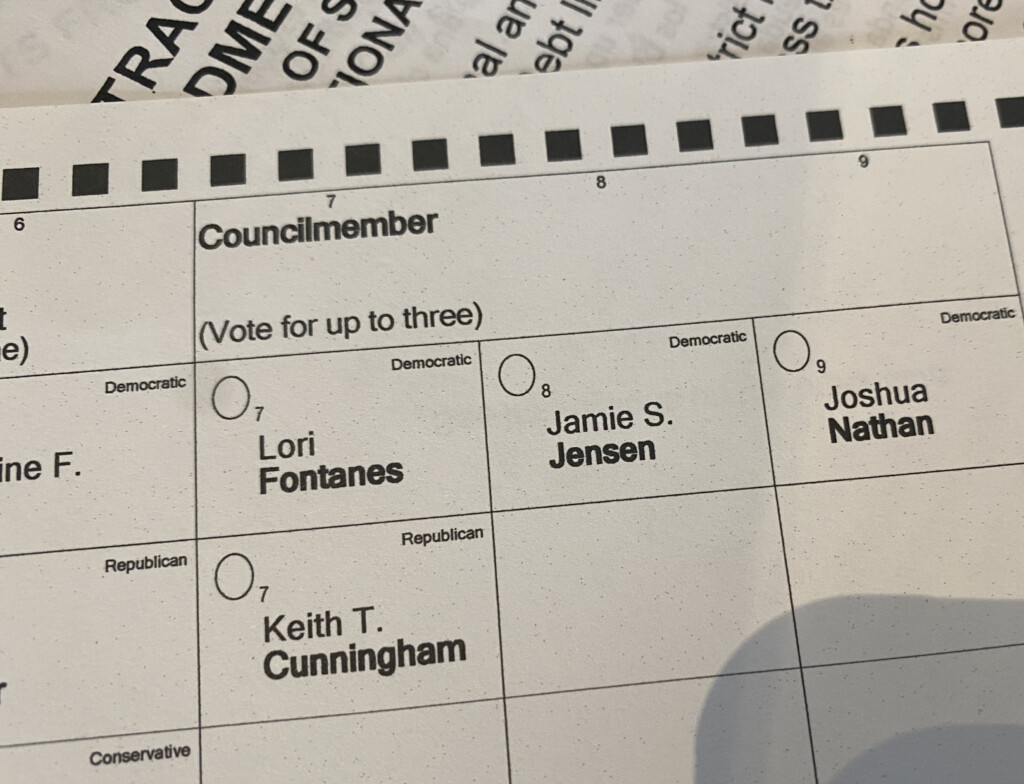
The following is a guest opinion piece by Councilmember Lori Fontanes. Fontanes won her Council seat in the fall of 2022 and began service on January 1st. She was on the ballot this fall but ceased active campaigning when she announced her plans to move from Rye in 2024.

As a candidate in the most recent City Council race, I did not campaign or speak out due to guidance from the state elections compliance office regarding my potential move. Now that the election is over, however, I believe it’s important for citizens to hear my side. This is because, unfortunately, a great deal of misinformation crisscrossed Rye in the last few months and, in my view, caused a lot of unnecessary confusion.
More importantly, I also want to present my case as to why voters need to consider the downsides of cross-endorsements and so-called “unity” tickets that were again a part of the discussion. To me, a transparent process and increased voter choice are more likely to provide accountability and civility than effectively predetermined outcomes. After all, if a government body doesn’t feel that it needs to answer to a robust process, it may well feel empowered to do what it wants, not what residents want.
Except for Bill Henderson, the new council in 2024 will be comprised of members who were either explicitly cross-endorsed or…well, whatever you want to call what just happened. It took several weeks to engage in dozens of conversations and to review the documentary evidence, but I’m now ready to share my story.
By Lori Fontanes
A colleague texted me on November 7th, Election Day morning.
“It’s weird telling people not to vote for you,” she wrote.
Yes, it would be weird if it were true. But it wasn’t. Despite what many people were told in the past few months, including many of my friends and neighbors, I never told people not to vote for me. I also didn’t tell them to vote for me. In fact, I could not speak publicly about the Rye City Council campaign because I was adhering to the terms of the New York State Board of Elections compliance office, both in word and in spirit. I recognize this is probably rather surprising. The other week, a very nice man told me proudly that “he didn’t vote for me” in the apparent expectation that I would thank him. But I never requested such a thing. There have been many similarly awkward moments in recent weeks and, I’ll confess, more than a few tears shed. Which is a shame. It simply did not have to end this way.
To explain what happened from my perspective, I want to go back to that moment in the summer when I first realized I’d likely need to move from Rye in 2024. Notice the word “likely”. We used the word “expected” in my August press release because, in truth, I had no precise idea then (or now), exactly when, or possibly even if, I’m finally leaving. (As you probably guessed, moving to another country as I hoped to turns out to be pretty complicated.) When I ran for my current one-year term I knew I could commit to 12 months in the position and had not expected to run again. Then, after a hard-fought race and ultimate victory in 2022, the Democrats persuaded me to join their slate in 2023 with the understanding that as a single mom and adjunct professor (two precarious jobs, for sure), I could not be absolutely certain how long I’d be able to stay in Rye. To be clear, there is no contract that says you must complete all four years and, in fact, other councilmembers have moved out of town and stepped off the council in recent memory. It’s a volunteer position with no health benefits and takes a fair amount of hours per week to fulfill. Hard to imagine anyone signing such a contract even if there were one.
Nevertheless, I have since heard people suggest that I should have either hidden my departure goals or never have accepted the Dem endorsement because I displaced a more suitable candidate. Let’s be clear: There was no such other candidate. Nor did I pursue the endorsement—the Democrats pursued me. They had calculated, quite correctly, that the two incumbents would have the best shot at winning as incumbents routinely win re-election races. Jamie Jensen was a fantastic addition to the slate but, believe me, neither major party has a glut of council wannabes knocking on their doors. This year, for example, the GOP only managed to fill one of three slots and in the last two council races, went down to the wire to get their candidate on the ballot.
Flash forward from the slate announcement in April to the first week of August. After a series of events that had increasingly made my life in Rye more expensive and less enjoyable, the final straw arrived in the form of a phone call. My son, a rising college senior, had called me (actually called!) to share the news that he wanted to take a gap year and then apply to medical school. Oh, and he didn’t want to stay in Rye. His friends and work prospects were now in Chicago where he had been studying since 2020. I have only one child and no other family in New York, so I’m sure you’ll understand that when I looked at my latest tax bill and weighed it against the need to help my child in his next life chapter, it was clear what I must do. After a truly dark night of the soul, I had a call with my contact at the Democratic Committee and told her the story. She could not have been more supportive. Neither of us knew what a potential move from Rye meant from an election standpoint so she promised to do some research and get back to me. In the meantime, I braced for the next stage because I anticipated that no matter how worthy my reasons, not everyone would be happy with the situation.
That would be an understatement.
Some people tried to talk me into not telling voters about the move. Some people tried to talk me out of moving (my mother, for one). Some people didn’t talk to me at all for many weeks. None of that changed my mind. Even if I could conceal my intentions (how do you hide a potential house sale?), there was simply no way I could not tell voters about something that material to their choice on Election Day.
It took a little back and forth with the oversight staff but here’s how it went. At first, we thought I had to step down completely and remove my name from the ballot. On the contrary, we were quickly told that the window for doing that is very short and that even if I had died, my name would remain on the ballot. This means that, yes, I was on the ballot for November 7th and, yes, people could vote for me, and, yes, I could serve. I didn’t know this during my “dark night of the soul” nor for weeks afterward. Instead, as soon as I shared news of my crisis, the power plays began.
Let’s take a moment to look at the state role in election oversight. This role is not only about counting votes—as important as that is—but also about campaign finance. In short, the main reason for sharing consequential information was that I could not, in good conscience, accept money from folks who put their hope and trust in me. Even if it were legal to do so, I could not have been able to sleep at night if I were to start making plans for a move and continue to accept checks from people who didn’t know I might not be staying past the following year. The first and last press release about the turn of events used language we received from the compliance office. As of August 9, 2023, I, a candidate for Rye City Council, would no longer be actively campaigning.
Almost immediately after I closed my mouth, however, others rushed in to supply words I never said. Unfortunately, I didn’t find out most of what they were saying until late in the game. But some things I discovered right away.
Very soon after the announcement, I spoke with someone whom I will call Person One (P1). To my surprise, P1 shared something to the effect that they intended to try to reach out to both political parties and get them to work together. People close to me or who have read my previous writing on the subject of cross-endorsements, already know I think this strategy is not good for a healthy democracy. (Case in point, of the present Council, the Mayor and two of his allies were cross-endorsed and a third ran unopposed.) To me, “unity tickets” are just another way of saying we failed to provide you with a choice at the ballot box.
P1 also seemed to recognize their plan might not be easy to pull off. They told me not to talk about the idea yet because it could be a heavy lift for those who would not support the opposite party for any reason. They had no cause to worry. I would not be attending Dem Committee meetings or any other campaign activities and didn’t even want to talk about the election with my friends. But my heart did sink a little. I really did think voters should make up their own minds. And I felt badly that I could not participate so as to help create the robust dialogue out of which I believe the best ideas emerge. Still, as much as I disliked the idea of cross-endorsements, I didn’t think I had the right to be involved with election strategy anymore. It would be roughly two months before I discovered what happened with P1’s plan.
Meanwhile, I had one more memorable conversation around the same time. At a social event, I ran into a lawyer colleague who posed an interesting hypothetical.
You know you still might win, they said.
I laughed. That possibility seemed awfully remote. But if it happened, I would obviously serve as long as possible, as close to the cut-off for a special election to be called. This exact scenario had happened in 2021 to a friend of mine so I was completely up-to-speed in how that worked. In the case of next year, a major election would take place in November so staying until the mid-September deadline would be the goal. I would not resign in January (why would I?) but would continue to serve the citizens of Rye as long as possible. Considering how much we accomplished in nine months this year, I felt confident I could probably do the same in 2024 or beyond, if necessary.
***
Even though I wasn’t campaigning, I spent a busy August and September doing my usual volunteer commitments on top of the council work and teaching three classes at Manhattanville College. I’d been involved in elections for three back-to-back years and, to be honest, I didn’t miss door knocking in the dog days of summer.
What I did enjoy was the actual work of governing. No, not the infighting on the dais—the real work. Fielding calls and emails from voters, attending meetings, reviewing drafts of proposed legislation, deep-diving on research, and, most of all, showing up for every parade, flag-raising, Eagle Scout celebration, first responder press conference, Memorial Day, Veterans Day and Pride Event that I could cram into my calendar. If Robin Latimer would be there singing God Bless America, you’d probably find me there, too. I love this part of elective office and will miss it deeply.
Back on the non-campaign trail, I also helped produce an emergency preparedness event at the Carver Center for the Port Chester/Rye NAACP, assisted the mayor in next steps on a comprehensive plan update, moderated a conversation at Square House for the Watershed Literary Festival, among other civic activities. From time to time I saw my fellow candidates around town but really had no sense of what was going on. As late as the first week of October, I still expected to lose and was standing by to help the new councilmembers in any way possible.
Then something weird happened. While wrapping up a conversation between P1 and someone I will call Person Two, the latter started to talk about the campaign and P1 jumped in to interrupt P2, suggesting, in essence, that I didn’t need to hear any of this. It was awkward, but since I didn’t want to be a part of any campaign business, I didn’t have an issue with it. What occurred next is where everything changed.
About half an hour later, P1 called me to say something along the lines of, you’re probably wondering why I cut you out of the conversation. In fact, I hadn’t been wondering but now I certainly was. In that rushed kind of way people can have when they’re telling you something unpleasant, P1 explained that the Republicans were planning to run an ad in the paper telling people not to vote for me. Notably, P1 claimed that P2 wanted to try to get me to run the ad but that P1 told them Lori would never do that. (That would be correct but beside the point.) As I tried to process what I was hearing, P1 rambled on about the GOP fear that I was going to win and that’s why they were doing this. Remembering the awful tactics that were deployed against me in the previous election cycle, I felt a stab of fear.
“You better not smear me,” I said, not joking. In 2022, someone posted a slur on Facebook that was so vile, the moderators actually had to take it down.
Sadly, P1 never asked me how I felt about this or explained why in the world they were going out of their way to coordinate with the GOP against an endorsed Democratic candidate. Even more than in August, this felt like a backroom maneuver.
I said, “Why don’t you let the voters decide?”
P1 didn’t answer.
***
Of course, I think we know the answer now, but that wasn’t obvious in early October. Please note, too, that at this time, not one lawn sign for write-in candidate Carolina Johnson had yet sprouted. The strategy predated that hysteria. This was about me and, in hindsight, clearly a protective move for the Republican candidate who, arguably, had the least community visibility and was, therefore, most likely to lose, even against a candidate who had not campaigned. Incumbency is indeed that powerful and, thanks to a grueling pitched battle on the current council, my profile was higher than ever.
Let me be clear, though. My opponents had every right to campaign against me. Even my fellow Democrats had the right to do what they did, no matter how much it caused me pain. What really bothered me wasn’t the idea of an opposition, but the tactics that were employed. Soon I would see exactly what those tactics were.
A week or so after my unsettling call with P1, I got an email while at Chicago O’Hare waiting for a return flight to New York after spending a few days with my son. Based on the contents of the email, I recognized that the sender probably didn’t realize I was not on board with the unity ticket plan. It contained some marketing language for the effort, including a few things that were erroneous and some things that were merely spin. I would never attempt to stop someone from expressing their opinion but the errors could not stand. Among them were words that would soon come back to haunt me—that I was telling supporters not to vote for me.
The copy also claimed that I was leaving Rye in “early 2024” (never true). Regarding the departure date, I responded, “Not sure how that rumor got started!” I had a few guesses, but again, I didn’t feel I had any right to interfere with their campaign and did not engage on the spin. Sitting at the boarding gate, however, I felt deep unease and wondered what else was going on, especially what else was being said in my name but without my knowledge.
The email sender fixed the errors. P1, also on the email chain, signed off. From that date, October 15th, key decision makers of both political parties were informed, in writing, that I was not telling my constituents not to vote for me.
***
As soon as I returned from Chicago, I recognized a mood shift. Some of my Dem associates began to avoid me and others were extra huggy as if they felt I deserved a boost. By the end of the week, whatever whisper tactics had been launched broke into the open. My friends reached out about “ridiculous emails” and neighbors stopped me in the street upset about “misleading” stories. Around this time, I got a phone call from a colleague who felt I needed to hear something. They told me that P1 had reached out earlier and asked them to try to talk me into running a full-page ad telling citizens not to vote for me. The colleague told P1 straight up that I would never do it. Huh, where had I heard that phrase before?
I didn’t say anything out loud but realized the implications at once. Although P1 had blamed this scheme on the GOP, evidently there had at least been a moment, when the idea had apparently been P1’s. The audacity of taking credit for telling the Republicans “Lori will never do it” and pinning it on P2! Perhaps this was why P1 sounded so weird on the call. Furthermore, thinking about the abbreviated conversation with P2, if the issue had not been raised in front of me, would I not have found out until the ad ran? Clearly, P2 thought that I had agreed to the strategy. But, of course, I didn’t endorse the idea and didn’t even know about it. From this point on, I never trusted P1 again.
***
In the middle of these revelations, the October surprise dropped. For those who don’t know, October surprise is a campaign strategy often engineered by candidates to shake up races in the weeks before voting day. In Rye’s case, Carolina’s write-in campaign for a council seat definitely qualified as a game-changer. The first story may have been in MyRye on the morning of October 26th. I had heard rumblings that week but found nothing in the October 27th issue of the local paper. Advertising and other items, some with mistakes and spin, made it into print and later online. Among these, a letter to the editor that claims I asked people not to vote for me blah blah and a front-page story that says I “stopped campaigning in the spring”. August is not spring but I digress….
To put it plainly, Team Carolina’s quest a scant two weeks before Election Day wouldn’t fly for two reasons: math and logic. As a cudgel to further ensure that no one would vote for me, however, it was the perfect weapon. I don’t think this was necessarily the pro-Carolina goal; maybe she really wanted to and thought she could win. In my opinion, though, that was always a fantasy.
Take the math part. Although the scuttlebutt that went around seemed to suggest that a vote for me was a vote for Carolina that makes no sense. Voting, especially with three slots, is not a zero-sum game. Yes, it made the math a little more interesting but it was most likely to narrow the path of the lowest scoring candidate, not gain her a seat. Then there’s the logic part. If candidates could launch a successful write-in campaign two weeks before the election, lots of people would go that route and save a ton of money. Of course, it doesn’t work that way. No matter how many doors you knock on or signs you put up, time is simply not on your side. And then there was the matter of the very recent council uproar in which this last-minute candidate played a part. Yes, people have short attention spans, but come on. The only person that Carolina would take votes from was me—not because they were voting for her instead of me but because people had been told that voting for me—even if they didn’t vote for her—was somehow a vote for her.
Yeah, right.
By this point, it was a game of whack-a-mole. Although I knew with close to certainty there was no way I could win (as I thought all along until the “unity” boosters obtained a crystal ball), the painful encounters continued up to Election Day and beyond. This more than anything is the heart of my story. It’s difficult to express just how terrible it feels to have your friends manipulated and turned against you. It’s one thing to post crap about national candidates on social media, it’s another thing to post false narratives on local media when the person who is targeted knows exactly what you did and must deal with the fallout everywhere they go.
You may say, well, that’s politics and I guess it is. But Rye is not Washington or Albany or even White Plains. I thought we were better than this. Certainly, I thought my own party members were more honorable and most were. Significantly, my rep at the Dem Committee told me they did not cross-endorse the GOP candidate and, as far as I know, the Republican Committee did not officially cross-endorse any Dems. Instead, a small number of Democrats took out their own endorsed candidate in support of the Republican. The call was coming from inside the house.
***
Throughout this entire ordeal, I never asked anyone (except my son, of course!) to vote for me. If someone said something counterfactual, I would correct them and I did share with a few friends how upset I was about what was being said. My entire career as a writer, educator and journalist, has always been about seeking truth. There was no way I would agree to go along with lies. In my view, this was not fair to me and, more importantly, not fair to voters. Constrained by my understanding of the compliance rules, however, I felt I could not go to the press to state my case and most of what I learned, I found out too late to be useful anyway. If a resident asked me a question, though, I answered them honestly. No, I am not leaving Rye in January. No, the mayor does not have the power to appoint a replacement if there is a vacancy on the council. No, I didn’t ask people not to vote for me.
Having been a candidate twice before, I already knew the final weeks before an election is often when people lose their damn minds. So, in a way, this sorry turn of events fit a familiar pattern. Which doesn’t take away from the sheer gall of the opposition’s last move in the waning days of the race.
Even after making it abundantly clear that I would not campaign, a couple of people reached out in a last-ditch effort to get me to go negative on myself and, not surprisingly, Carolina. Even P1 attempted to call me. (I had the phone turned down and missed the call but didn’t call back. Naturally.) Those who did connect shared the same fear-mongering tales I’d already heard and dismissed. I told them I would not make a statement. First of all, I didn’t think putting out such a statement would be compliant, no matter the contents. Second, why in the world would I do that? And, third, I would not go negative, period, end of story.
On Election Day, the citizens surprised a few folks. In spite of the considerable effort to get people not to vote for me, almost 1,000 did anyway. Carolina, as predicted, came nowhere near that. Yes, many residents probably had no idea about the kerfuffle and voted for me because of the D, but that’s true for each of the candidates and their respective party lines. I was blown away by the turnout and want to thank everyone—and I mean everyone—for participating in this off-off-year election, whether you voted for me or not. Maybe especially if you didn’t vote for me. You performed your civic duty and that’s what matters.
Before anyone starts another round of rumors, though, let me state unequivocally that I lost and my opponents won. There’s no doubt about this election and I am not implying otherwise. My concern is the same as it has been for some time: lack of voter choice. As some of you already know, I don’t post on social media about this problem I do the hard work. My attempt at public office in 2021 occurred because of a cross-endorsement. I felt strongly then and feel the same way now. We need more candidates and more choices, not fewer. Most of all, I believe those choices should be made at the ballot box, not in backrooms.
Regardless, I get that the New York State election law and my dark night of the soul created a storytelling vacuum and inevitable confusion. Yes, it started out confusing, but I would also argue that some capitalized on the perplexity. They knew that most voters have no idea about the ins and outs of the process. In one example, several residents reported they went to early voting and were stunned to find my name on the ballot after being told I wasn’t running. They felt betrayed. I didn’t know what to tell them.
You may also say, you’re leaving anyway, why do you care? As I hope I’ve made clear, I was never going to abandon Rye and there were other options if I left, such as a special election, which is how Josh Nathan, in a recent case, first got on the council. Nevertheless, I fully understand why a voter who had all the facts would still not vote for me and I support and respect such a decision.
In the end, however, this really isn’t about winning or losing. It’s about how we get there. The ends never ever justify the means. To avoid such an outcome in the future, as well as to not discourage future potential candidates, I firmly believe we must do better. After all, this problem is not exclusive to our little city. A major election of enormous consequence is less than a year away. How can we preach to our children about critical thinking skills if we don’t practice those skills ourselves? Media literacy, at every level of messaging, is more important than ever.
Therefore, while the election remains (somewhat) fresh in your mind, maybe it would help to ask a few questions. Who told you these things that turned out not to be true? What do you think they hoped to gain from that? As I explain to my College Writing students each semester, make sure you understand the nature of your source and their motivations. It may be an English class but I find the Latin term cui bono (who benefits?) can often unpack the real meaning of a message.
***
On the last evening before Election Day, I attended a routine meeting of the Board of Architectural Review where I’ve been serving as council liaison. BAR meetings, if you haven’t yet had the pleasure, feature a cornucopia of small town characters and storylines. Developers, architects, homeowners, solar panel reps and lawyers bring plans for everything from new windows to ginormous mansions before a citizen board of experts, hoping to hear two magic words: “It’s approved.” Most projects glide through the process but every once in a while, friction enters the Mayor’s Conference Room where the presentations take place. That particular Monday, everything went smoothly until the very last item. The building department staffer announced the project to the waiting area and a group of neighbors filed into the overstuffed space until most of the chairs were taken. Although I sit at the conference table with the rest of the board members, I’m not a voting member and usually I just listen and take notes. Not this time.
As it turned out, I knew the exact parcel that was under discussion. Furthermore, after living next to two different major construction projects in two years, I had personal experience with the entire process, from registered letter to moving-in day. In addition, I had been before this very board myself in the summer of 2021, as a private citizen not yet on the council, and I related to the anxiety of the neighbors. On the other hand, however, having served on the Conservation Commission/Advisory Council that attends Planning Commission meetings, I also knew more about the laws surrounding construction, including storm water retention and other topics that were top of mind in this community. And so I spoke up.
Using every ounce of diplomacy I could muster, I addressed the concerns around the room. It’s possibly an occupational bias, but I always think that communicating with folks is the fastest way to the best solution. Effective storytelling fixes many problems. In the end, everyone stayed so late chatting that they started to flicker the lights to get us to leave. Citizens were smiling and laughing as they left City Hall where a beautiful fall evening awaited. As I drove home, I realized something more important than the next day’s election outcome. For this one perfect meeting of the Board of Architectural Review, everything was worth it. Thank you, Rye, for the honor of serving you.

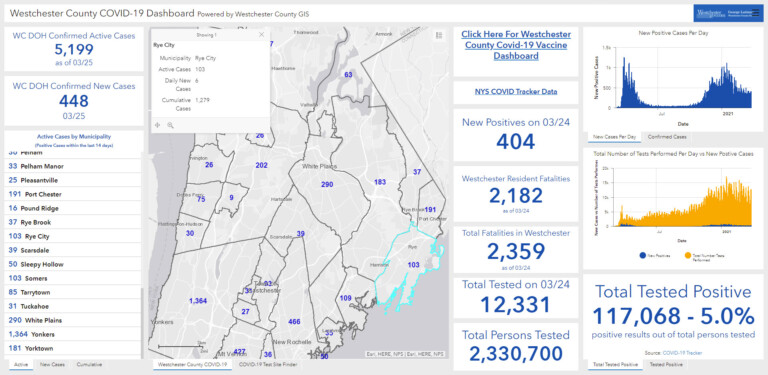
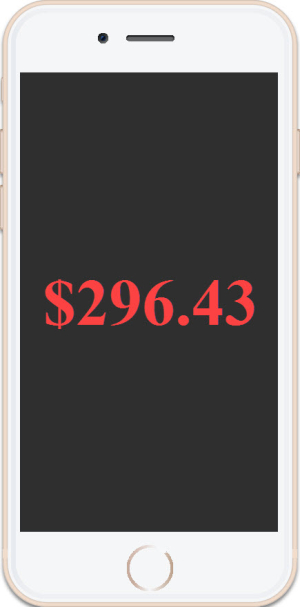

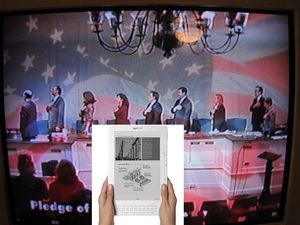
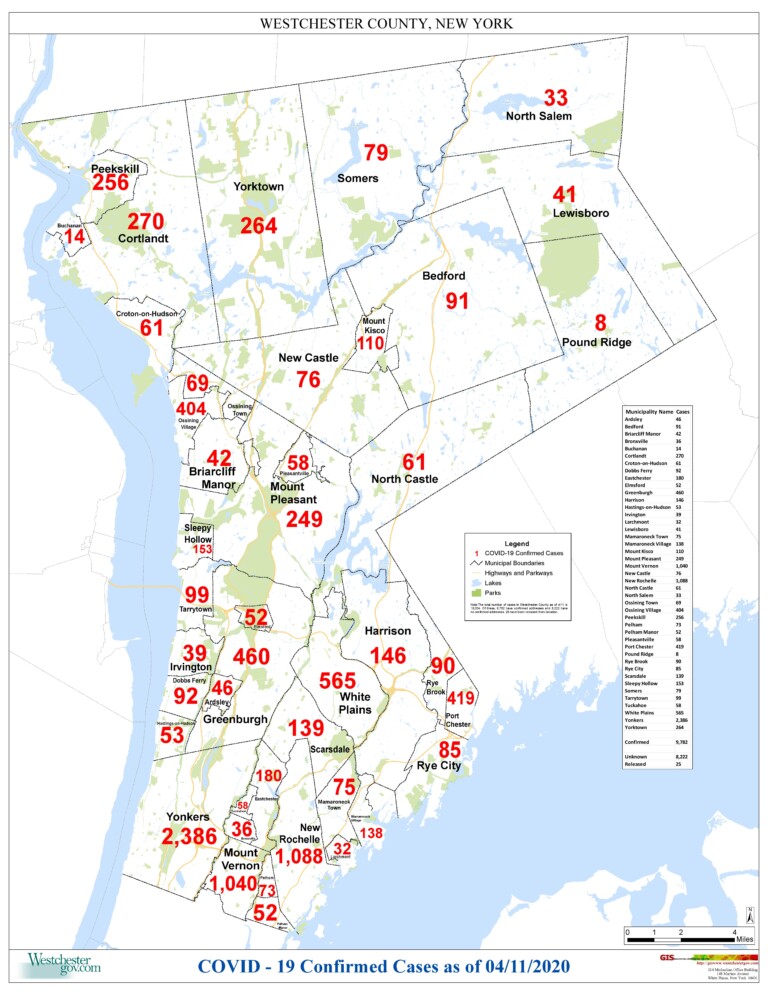

Heartfelt thanks to Lori Fontanes for contributing to Rye transparency! As one of the confused voters, I now more deeply understand my confusion and am so glad I went ahead and voted for her. Honor and honesty have been in short supply around here, and I will truly miss her.